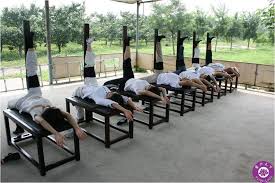La: To stretch.
Jin: A Chinese medical term similar to tendons and ligaments.
Lajin: To stretch and to restore functions of the Jin where Jin-Suo has occurred, so as to self heal, restore health and prevent aging.
Jin-Suo: Contraction or degeneration of the functions of the Jin, which is the major contributor to aging and most disorders.

Jin: A Chinese medical term similar to tendons and ligaments.
Lajin: To stretch and to restore functions of the Jin where Jin-Suo has occurred, so as to self heal, restore health and prevent aging.
Jin-Suo: Contraction or degeneration of the functions of the Jin, which is the major contributor to aging and most disorders.
Participants at a workshop doing Paida and Lajin ↖






DIY lajin at home with chairs at door frame ↖
What are the diagnostic and self-healing properties of Lajin?
In addition to its therapeutic functions, Lajin can also help in diagnosis. Physical illnesses can be diagnosed from the Lajin posture and self-healed in the course of Lajin practice.
Take the following for instance:
1. If there is knee pain and the knees cannot be straightened, these are symptoms of Jin-Suo (contraction of tendons). This indicates that the Liver Meridian (the energy channel related to liver) is blocked, because liver governs the Jin (tendons). Obstructed Liver Meridian will certainly affect the stomach and the spleen. This is because the liver (which has the properties of wood, according to Chinese Wu Xing theory) negatively impacts the spleen (which has the properties of earth).
Lajin is both an accurate "physical check-up" and precise self-healing in action.
2. If there is pain in the back of the knees, it indicates that the Urinary Bladder Meridian is blocked, and the lower back has problems, which may be caused by lumbar vertebrae and/or kidney malfunction, or both. This is because the functions of the urinary bladder and the kidney are closely related — both with the properties of water — and one organ cannot stay healthy if the other is not. Diseases caused by Urinary Bladder Meridian blockages include edema, obesity, frequent urination, diabetes, and so on.
3. During Lajin in reclining position, if the raised hands and arms cannot reach the surface of the bench, this may indicate risks of frozen shoulder, and it contributes to diseases of the heart, lung, head, five sense organs (ears, eyes, lips, nose and tongue) and breasts.
4. If the raised leg cannot stretch straight and the lowered leg hangs in the air without touching the ground, it suggests that the Jin-Suo (contraction of tendons) is severe, the Liver, Spleen and Kidney Meridians are blocked, and that there is lower back and knee pain, and even numerous problems with vital organs of the body. Women with these symptoms may have gynecological disorders, whereas men may have prostate problems.
DIY lajin at home with chairs at door frame ↖
Lajin or tendons stretching is a simple and effective self-healing method. It is both an accurate "physical check-up" and
precise self-healing in action. When practiced correctly, it can help enhance overall health and
promote longevity by cleansing vital energy channels (meridians) in the body, thus enabling
smooth Qi and blood flow. This in turn improves various conditions, acute or chronic such as high
blood pressure, diabetes, gynaecological and prostate disorders, dislocations as well as pains
caused by Jin-Suo.

No comments:
Post a Comment